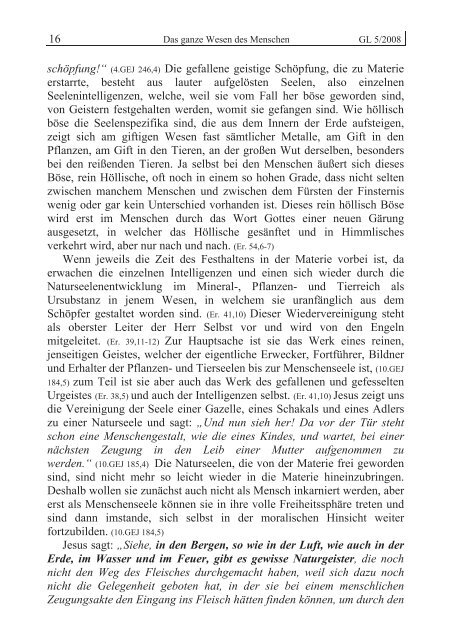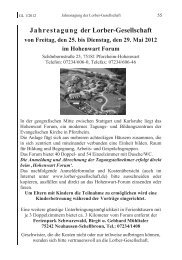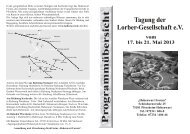GL 5/2008 - der Lorber-Gesellschaft eV
GL 5/2008 - der Lorber-Gesellschaft eV
GL 5/2008 - der Lorber-Gesellschaft eV
- Keine Tags gefunden...
Erfolgreiche ePaper selbst erstellen
Machen Sie aus Ihren PDF Publikationen ein blätterbares Flipbook mit unserer einzigartigen Google optimierten e-Paper Software.
The role of community involvement in planning hospital services 16go well beyond consultation processes to directly engage citizens and their representatives in needsidentification, planning and decision-making at appropriate levels.” 22 The Report proposes that acentral responsibility of the Local Health Offices should be promoting citizen and communityparticipation through consumer panels and other mechanisms.Specific mention is given to the importance and participation process within the acute sector. Thenew hospital accreditation programme – requiring that service plans and performance managementsystems give “real weight” to consultation and participation – “will be an important driver forresponsiveness and engagement between hospitals and their patients.” The authors of the reportdid not, however, consi<strong>der</strong> it appropriate to prescribe set structures at local level to promote userinvolvement and stakehol<strong>der</strong> representation, “but feel it is more effective to build on guidingprinciples and practices already developed which can be reflected in the varying needs of individualcommunities.” 23THE NATIONAL TASK FORCE ON MEDICAL STAFFING (THE HANLY REPORT)The National Task Force on Medical Staffing was established in February 2002 by the Minister forHealth and Children. Its purpose was to devise an implementation plan for reducing substantially theaverage working hours of Non Consultant Hospital Doctors (NCHDs) to meet the requirements of theEuropean Working Time Directive (EWTD), 24 to plan for the implementation of a consultant-providedservice, and to address the medical education and training needs associated with the EWTD and themove to a consultant-provided service. The Task Force’s terms of reference charged it with‘‘devising, costing and promoting implementation of a new model of hospital service delivery basedon appropriately trained doctors providing patients with the highest quality service, using availableresources as equitably, efficiently and effectively as possible.’’In June 2003, the Task Force delivered a set of wide-ranging proposals and concluded that aconsultant-provided service is the only viable means of providing safe high quality patient care whilereducing the working hours of NCHDs and reorganizing medical education and trainingappropriately. Critically, the proposals for reducing the working hours of NCHDs, together with thecase for a consultant-provided service and changes to medical education and training, have22 Ibid.23 Ibid.24 The EWTD requires that, by 1 August 2004, NCHDs must no longer work for more than an average of 58hours per week on the hospital site. By this date they cannot be required to work for more than 13 hours perday on-site, and certain other rules regarding minimum rest and break periods must also be put in place. By 1August 2007, NCHDs cannot be required to work more than an average of 56 hours per week on-site. This limitto be reduced to an average of 48 hours by 1 August 2009.
















